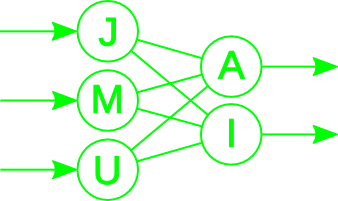Ethics Discussion
Full credit for this activity requires addressing at least one of these questions through Piazza before class time on Friday the 30th.
-
Section 26.3 of the textbook describes six potential
problems associated with the development of AI:
- People might lose their jobs to automation.
- People might have too much (or too little) leisure time.
- People might lose their sense of being unique.
- AI systems might be used toward undesirable ends.
- The use of AI systems might result in a loss of accountability.
- People might lose their jobs to automation.
- The success of AI might mean the end of the human race.
After reading chapter 26, which, of these potential problems do you find most worrying? Why?
Which of these potential problems do you find least worrying?
-
Imagine that, while researching your poster topic, you stumble across an algorithmic trick that would vastly advance the progress of AI research. If this trick were revealed, all of the difficult problems that currently face AI researchers would become tractable overnight. You are confident that if this trick were widely known there would be ultraintelligent machines within 3-5 years. You are also confident that if you do not reveal the trick no one else will discover it within the foreseeable future.
What do you do? Why?
-
At the beginning of the course we discussed the following questions:
Do you think that it is possible for machines to be intelligent? Do you think that, in your lifetime, there will be machines that you consider to be intelligent?
Was there anything in the most recent reading, or anything else you have learned this semester, that changes your answer these questions?
- In the event that we do develop machines with human-level intelligence, do you think it would be appropriate to grant them the same rights as human beings? Why or why not?
